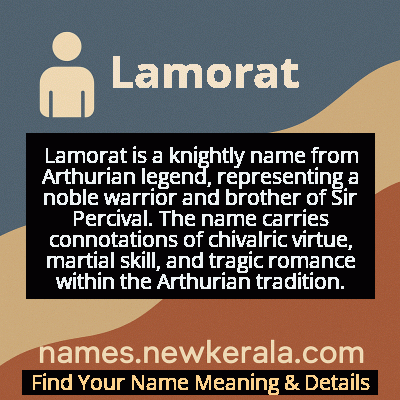Lamorat Name Meaning & Details
Origin, Popularity, Numerology Analysis & Name Meaning of Lamorat
Discover the origin, meaning, and cultural significance of the name LAMORAT. Delve into its historical roots and explore the lasting impact it has had on communities and traditions.
Name
Lamorat
Gender
Male
Origin
Arthurian
Lucky Number
8
Meaning of the Name - Lamorat
Lamorat is a knightly name from Arthurian legend, representing a noble warrior and brother of Sir Percival. The name carries connotations of chivalric virtue, martial skill, and tragic romance within the Arthurian tradition.
Lamorat - Complete Numerology Analysis
Your Numerology Number
Based on Pythagorean Numerology System
Ruling Planet
Saturn
Positive Nature
Ambitious, efficient, realistic, and authoritative.
Negative Traits
Materialistic, stressed, confrontational, and can be overly ambitious.
Lucky Colours
Dark blue, black.
Lucky Days
Saturday.
Lucky Stones
Blue sapphire, amethyst.
Harmony Numbers
2, 4, 6.
Best Suited Professions
Business leaders, managers, financial services, law enforcement.
What People Like About You
Leadership, determination, organizational skills.
Famous People Named Lamorat
Sir Lamorak
Arthurian Knight
Considered one of the greatest knights of the Round Table, third strongest after Lancelot and Tristan
Lamorat de Galis
Literary Character
Featured in Post-Vulgate Cycle as a noble knight and brother to Percival, known for his tragic romance
Lamorak in Modern Fiction
Literary Character
Appears in T.H. White's 'The Once and Future King' and other modern Arthurian adaptations
Name Variations & International Equivalents
Click on blue names to explore their detailed meanings. Gray names with will be available soon.
Cultural & Historical Significance
The knight's tragic romance with Morgause, who was not only King Arthur's half-sister but also the mother of Gawain and his brothers, creates one of the most dramatic narrative arcs in Arthurian cycles. This forbidden relationship ultimately leads to Lamorat's murder at the hands of Gawain and his siblings, serving as a powerful commentary on the themes of vengeance, honor codes, and the consequences of transgressing social boundaries within the chivalric world. His story illustrates how personal passions could disrupt the carefully maintained order of Arthur's court, foreshadowing the eventual collapse of Camelot.
Extended Personality Analysis
Lamorat is characterized as a knight of extraordinary martial ability and steadfast loyalty, yet one whose passionate nature frequently clashes with the strict codes of chivalry he is sworn to uphold. He represents the pinnacle of knightly virtue through his remarkable strength and combat proficiency, consistently ranked among the elite warriors of the Round Table in Arthurian literature. His deep familial devotion, particularly to his brother Percival, and his unwavering commitment to honor in both battle and tournament settings demonstrate his noble character.
However, Lamorat's intense emotional nature becomes evident through his doomed relationship with Morgause, revealing a capacity for profound romantic attachment that ultimately proves fatal. This combination of military excellence and emotional susceptibility renders him one of the more nuanced and relatable figures in Arthurian mythology. His character arc serves as a poignant reminder that even the most accomplished knights were vulnerable to human desires and the complex moral dilemmas that could arise from them within the rigid structure of medieval courtly society.
Modern Usage & Popularity
In contemporary contexts, Lamorat remains an exceptionally uncommon given name, used predominantly by Arthurian scholars, historical fiction authors, and parents drawn to distinctive mythological names. The name finds occasional application within fantasy literature and gaming circles where Arthurian motifs enjoy popularity. It has never appeared in official baby name registries and maintains a specialized appeal, particularly among those with interests in medieval literature and knightly heritage. The name's intricate nature and strong Arthurian connections render it more appropriate for fictional personas than for widespread use in modern naming practices.
Symbolic & Spiritual Meanings
Lamorat symbolizes the inherent conflict between chivalric ideals and human emotion, representing both knightly excellence and tragic imperfection. His narrative serves as an allegory for the struggle between obligation and personal desire, illustrating how even the most virtuous knights could be undermined by human vulnerabilities. The name evokes associations of exceptional combat prowess balanced by emotional openness, making it emblematic of the equilibrium between power and sensitivity. His ultimate fate at the hands of fellow knights embodies the concept of honor compromised and the corrosive impact of revenge within aristocratic social structures.

